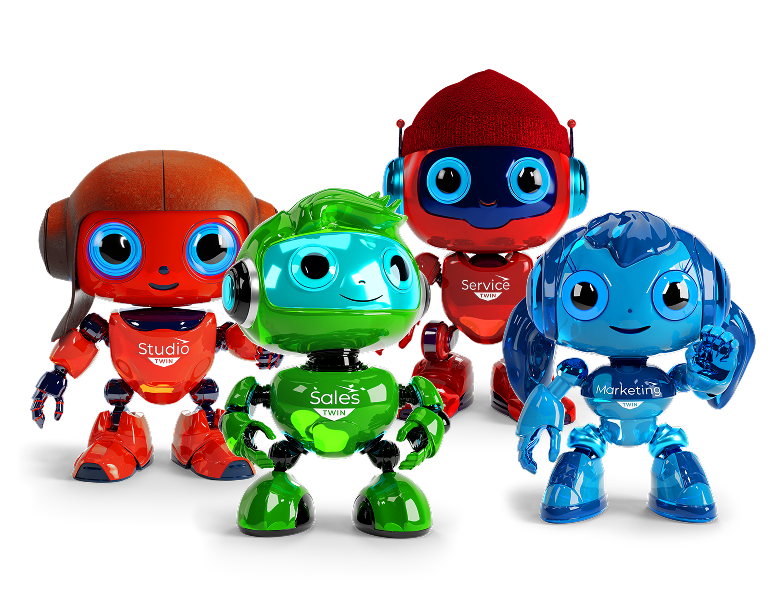-
No-Code
Platform
-
Studio
No-code agentic platform delivering the fastest time-to-value and the highest ROI
-
Studio
-
AI-Native CRM
CRM
-
AI-Native CRM
New era CRM to manage customer & operational workflows
CRM Products -
AI-Native CRM
- Industries
- Customers
- Partners
- About
Enhance Business Ops with Creatio’s Agentic CRM

CRMs are no longer static databases that rely on manual input to store and retrieve customer information. With the rise of CRM AI agents, these platforms have evolved into intelligent systems that users can interact with through natural language, making it easier than ever to complete tasks and access insights.
According to Gartner, by 2028, more than 30% of enterprise applications, including CRMs, will incorporate AI agents. This shows a significant shift in how organizations leverage technology to manage customer relationships and drive growth.
In this article, we’ll explore what CRM AI agents are, how they enhance user productivity, and the tangible benefits of integrating them into your tech stack.
Key takeaways
- CRM AI agents are intelligent digital teammates built into CRM platforms that automate tasks, provide real-time insights, and streamline workflows.
- AI agents allow users to work with a CRM system through natural language commands instead of manual clicks.
- AI agents in CRM help teams across sales, marketing, customer service, and operations save time, improve data accuracy, and deliver more personalized customer experiences.
- Industries like financial services, retail, and insurance are already seeing measurable business impact from adopting AI-powered CRM systems.
The State of AI Agents & No-Code
Learn how 560+ leaders across the world use AI and no-code to drive innovation today
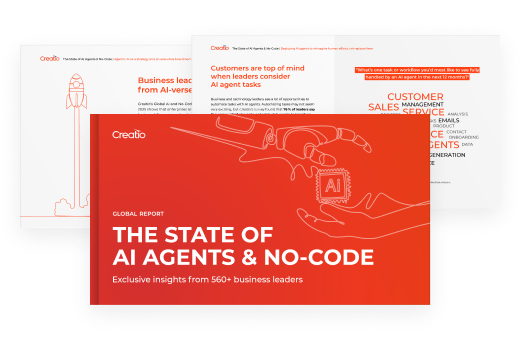
What are CRM AI Agents?
CRM AI agents are digital teammates embedded within CRM platforms that perform tasks on behalf of users. Powered by artificial intelligence, natural language processing, and machine learning, these agents can understand context, exercise multi-step processes, and take proactive action with minimal human input. Unlike basic chatbots or rule-based automation, CRM AI agents learn from interactions, adapt over time, and continuously improve their performance.
AI agents in CRM can:
- automate repetitive tasks
- orchestrate workflows
- navigate through the CRM system
- provide insights in real-time
- personalize communication
- and much more
Traditional CRMs vs CRMs with AI Agents
Aspect
| Traditional CRM
| CRM with AI Agents |
| Data entry & updates | Manual input and update by users | Automatic data capture from calls, emails, and chats, updated in real-time |
| Navigation | Users click through dashboards and menus to find information | Users ask AI agents in natural language to surface information for them |
Reporting & insights
| Reports generated manually | Real-time dashboards and predictive insights delivered automatically |
| Task management | Follow-ups, scheduling, and reminders set manually | AI agents handle scheduling, reminders, and follow-ups automatically |
Process optimization
| Workflow changes require manual configuration | AI agents suggest and even build workflows automatically from natural language input |
Users interact with CRM AI agents much like they would with a human colleague. Communication happens through natural language; users can type their questions and instructions in a chat window or use voice commands.
Instead of navigating complex menus or manually updating records, a salesperson might simply type, “Recommend the best cross-sell and up-sell opportunities,” or a service agent could ask, “Summarize the customer’s last three interactions.” The AI agent interprets the intent and executes the task, often suggesting next steps.
This marks a major shift from the traditional way people used CRMs. In the past, employees had to navigate dashboards, search through records, and manually compile reports to get insights or perform routine actions. Summarizing a customer’s history often meant reading through dozens of notes or piecing together fragmented information across tools.
With AI agents, those once time-consuming tasks are automated, freeing users to focus on strategy, decision-making, and direct customer engagement rather than administrative work.
Why Should Businesses Consider Using CRM AI Agents
CRM AI agents offer businesses practical advantages that go beyond simple automation. They help organizations streamline everyday processes, ensure data is accurate and up to date, and surface insights at the right time to guide decision-making. By embedding these capabilities into CRM systems, businesses can create more efficient workflows, support employees in their roles, and deliver better customer experiences.
Let’s explore the benefits of using CRM AI agents:
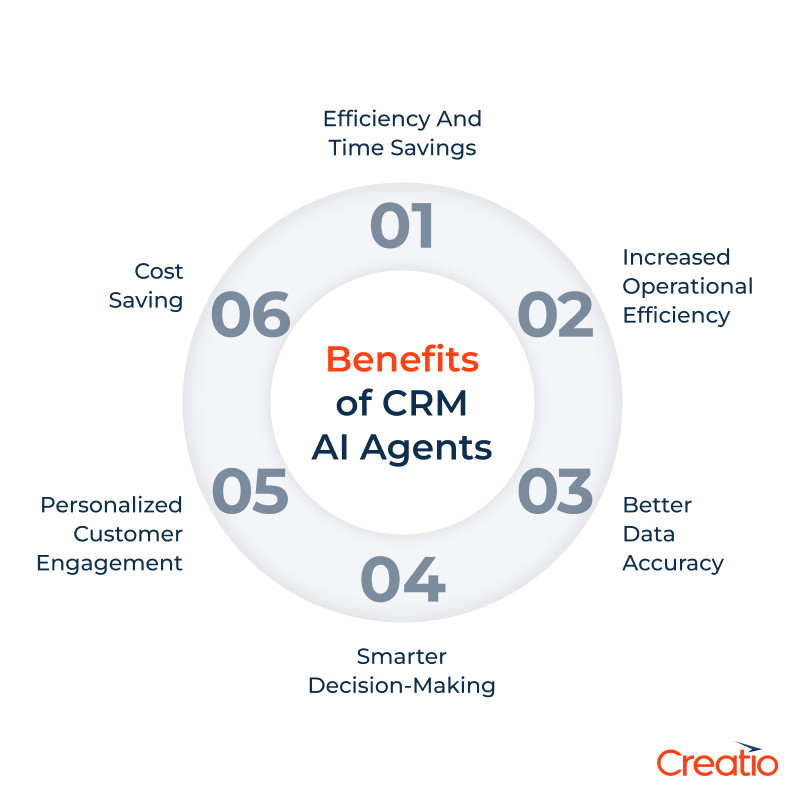
1. Efficiency and time savings
AI agents handle repetitive and administrative tasks, such as updating records, scheduling follow-ups, or summarizing interactions, so employees can spend more time on high-value activities like building customer relationships or closing deals.
They also remove the friction of navigating complex CRM interfaces, where users previously had to click through multiple menus or manually search for information.
2. Increased operational efficiency
Beyond automating routine tasks, CRM AI agents actively contribute to making organizations more efficient at scale. They can analyze how processes are executed across teams, identify bottlenecks, and suggest improvements that streamline operations.
For example, an AI agent might highlight redundant approval steps in a sales workflow, recommend reallocating resources to busier support queues, or propose a more efficient lead assignment model. By continuously monitoring workflows and usage patterns, AI agents don’t just execute tasks; they help design better processes.
3. Better data accuracy
CRM AI agents can automatically log information and update records without manual input. After a sales call, customer meeting, or support chat, the agent can capture key details, such as discussion points, decisions made, and next steps, and instantly update the CRM.
This eliminates the problem of incomplete or outdated records, ensures data accuracy, and saves employees from tedious note-taking. As a result, the CRM evolves from a static database into an intelligent system that reflects the most current state of customer relationships in real time.
4. Smarter decision-making
Instead of relying solely on historical reports, CRM AI agents provide insights and recommendations based on real-time data. For example, they can predict the likelihood of a deal closing, highlight accounts at risk of churn, or suggest the next best action to move a prospect forward. This enables CRM users to make smarter decisions that have real business impact.
5. Personalized customer engagement
AI agents analyze customer data across channels to tailor messaging, recommend relevant content, and anticipate needs. This ensures every interaction feels timely and relevant, increasing customer satisfaction and loyalty.
6. Cost saving
By automating routine tasks, reducing manual data entry, and accelerating processes, CRM AI agents help organizations lower operating costs. They reduce the need for additional headcount to handle growing workloads, cut down on time spent navigating systems, and minimize errors.
CRM AI Agents Use Cases
The real value of CRM AI agents becomes clear when we explore how they operate in real-world business scenarios. They support employees in sales, marketing, customer service, and everyday operations as their digital teammates. CRM AI agents can be embedded into every process and workflow, helping organizations work smarter, faster, and more effectively.
Everyday task automation
CRM AI agents take on the repetitive, day-to-day activities that often drain employee productivity, such as updating records, sending follow-ups, and generating reports. These tasks, while essential, consume valuable time that could have been spent engaging with customers. AI agents change that by automating such processes in the background.
- Data entry and update - CRM AI agents automatically capture details from calls, emails, and chats, then log them into the right fields to keep records accurate and up to date. This frees CRM users from having to manually update every account and reduces errors.
- Scheduling meetings - AI agents can efficiently schedule meetings between multiple parts by coordinating availability, sending calendar invites, and reminders.
- Sending follow-ups - CRM AI agents can automatically send personalized messages to potential customers, business partners, etc., to remind them about upcoming meetings or keep them engaged after initial contact.
- Surfacing insights - CRM users can leverage AI agents to surface crucial insights without having to click through the software to find information they need. This dramatically increases the speed at which users can obtain information while minimizing manual effort.
- Summarizing emails and meetings - AI agents can analyze emails and tune in during meetings to draft short, comprehensive summaries of current and past conversations. Instead of combing through email threads or taking notes during calls, CRM users can rely on AI agents to instantly provide the information they need.
- Data analysis and report generation - CRM AI agents can quickly analyze data and create reports and dashboards based on users' descriptions in natural language. Instead of manually compiling data from different accounts and tools, CRM users can ask an AI agent to do it for them and draft initial conclusions.
Results:
According to research by arXiv, humans working alongside AI agents experienced 73% greater productivity per worker.
Sales enablement
CRM AI agents act as intelligent digital assistants that support sales teams at every stage of the sales cycle. Instead of spending hours on administrative work or searching for information, salespeople can rely on AI agents to automate outreach, surface the most relevant insights, and recommend the next best actions to help close more deals.
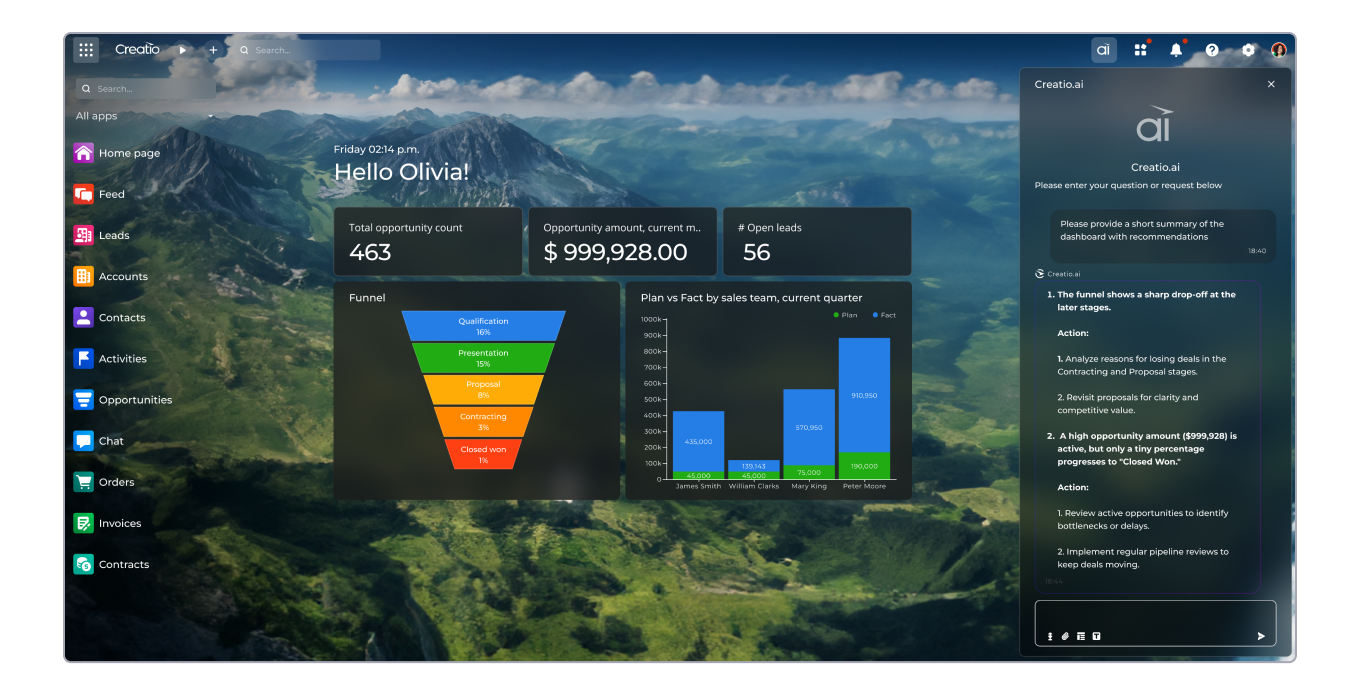
- Lead scoring and qualification - AI agents in CRM can automatically log in new leads and score them based on predefined criteria. They quickly analyze relevant data, such as demographic and firmographic information, website behavior, etc., and assess leads to determine their potential value and likelihood to convert.
- Personalized outreach at scale - sales professionals can leverage the AI agent’s ability to create personalized content and automate their outreach efforts at scale. CRM AI agents can use leads’ data to prepare tailored messages, send them through preferred channels, and schedule meetings with sales representatives, all without human input.
- Real-time recommendations - AI agents can provide next-best step recommendations in real time to help sales professionals close deals faster and increase deal value with relevant cross-selling and up-selling suggestions.
Results:
According to Forbes, businesses that implemented AI sales agents into their processes were able to automate up to 90% of all prospecting tasks.
Find out more about AI sales agents' use cases, their benefits, and the 10 best tools that accelerate sales cycles.
Marketing automation
CRM AI agents streamline marketing operations by personalizing and optimizing campaigns at scale. Instead of manually segmenting audiences, tracking engagement, or crafting A/B testing campaigns, marketers can rely on AI agents to analyze customer behavior, monitor campaign performance, and adjust them autonomously to maximize ROI.
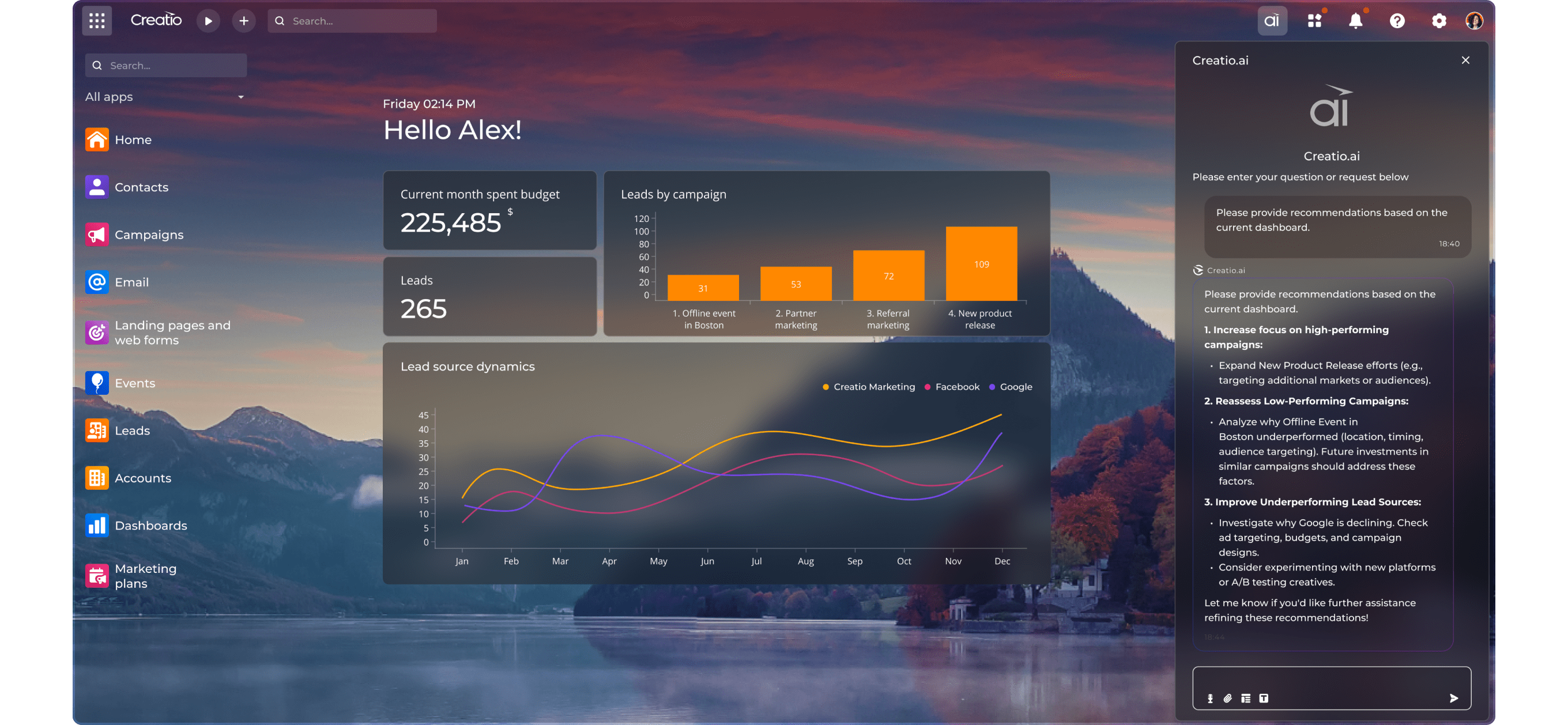
- Audience segmentation - CRM AI agents analyze customer data, including demographics, behavior, past interactions, and preferences, in real time to support more accurate customer segmentation and tailored marketing campaigns.
- Automatic content generation - AI agents can generate all sorts of content that marketing professionals can leverage in their campaigns, from emails and ad content to social media posts and articles. They can also create content tailored to specific personas and deliver it at the right buying stage to drive engagement.
- Campaign optimization - AI agents in CRM software can autonomously optimize campaigns across email, ads, and social media to maximize ROI. They continuously monitor campaign performance and adjust campaign elements, such as headlines, call to actions, visuals, delivery channels, and budget to increase engagement and conversion.
Results:
According to McKinsey, using AI agents to personalize marketing efforts can help lower customer acquisition costs by as much as 50%, increase marketing ROI by 10 to 30%, and boost revenue growth from 5 to 15%.
Find out more about eight popular AI agents in marketing’s use cases, core business benefits, and discover the best platforms with integrated AI agents.
Customer service support
CRM AI agents ensure faster, more personalized, and more proactive customer support. Instead of human customer service agents spending time searching through knowledge bases, manually reviewing past interactions, or handling repetitive inquiries, AI agents can instantly surface relevant answers, summarize case histories, and even resolve common issues autonomously.
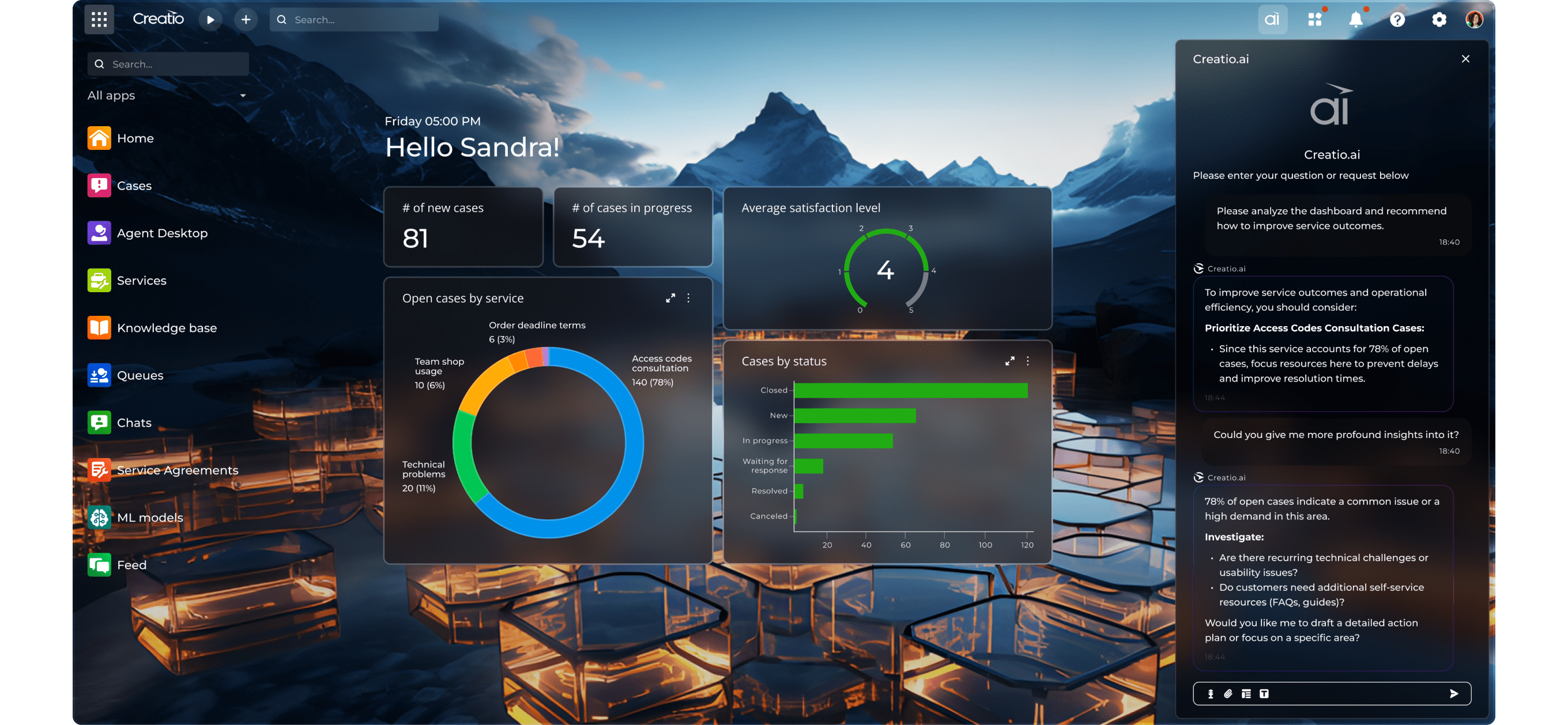
- Answering frequently asked questions - CRM AI agents can answer customer questions around the clock, providing instant support in natural language across multiple channels. They can analyze customer inquiries and deliver contextually relevant answers based on the company’s knowledge library. For more complex cases, a customer service AI agent can transfer the conversation to the human representative with full context, ensuring seamless support continuation.
- Assisting with case resolution - customer service representatives can use AI agents in CRM to surface crucial data, obtain summaries of previous interactions, and gain knowledge about similar cases and effective resolutions. Thanks to these insights, customer service agents can provide timely and relevant support without having to navigate through the CRM to find information they need.
- Sentiment analysis - CRM AI agents support proactive customer support by analyzing client sentiment. They can monitor social media mentions, feedback forms, and current conversations to determine how customers feel about the company and the support they have received so far. To make sure the right cases are prioritized, they flag dissatisfied or at-risk customers, escalate issues to the appropriate teams, and recommend timely interventions to help increase customer satisfaction and strengthen loyalty.
Results:
According to Nielsen Norman Group research, support agents who used AI agents could handle 13.8% more customer inquiries per hour.
Want to know more about how AI agents in customer service can support human representatives to deliver excellent customer service at scale? Read our article to discover more use cases, benefits, and the top 10 best tools.
Industry-Specific Use Cases of CRM AI Agents
Beyond general business benefits, CRM AI agents deliver unique value when tailored to the needs of specific industries. Each sector has its own challenges, whether it’s compliance in financial services, efficiency in insurance claim processes, or personalization in retail.
Below are a few examples of how different industries are applying CRM AI agents to achieve measurable impact.
Credit unions
CRM AI agents help credit unions bridge the gap between personalized member service and operational efficiency. By leveraging AI agents, credit unions can streamline loan processing, enhance member engagement, and facilitate compliance with industry regulations.
- Loan processing support – CRM AI agents have access to all relevant customer data and can easily verify and summarize key financial information, even from unstructured documents, such as banking statements, insurance records, and utility payments. They can also pre-fill required documents, flag missing data, and perform risk assessments to accelerate loan approvals.
- Member engagement – instead of sending generic offers, credit union professionals can use AI agents to craft tailored product recommendations (e.g., refinancing options, savings plans) based on member transaction patterns and life events. Based on real data insights, these offers are more relevant to members and are more likely to be met with positive reactions.
- Compliance and reporting—CRM AI agents can automatically generate reports that satisfy regulatory requirements with minimal manual effort, reduce the risk of errors, and ensure faster and more accurate audits.
Find out more about how AI supports credit union operations.
Real-Life example: Ent Credit Union & Creatio Agentic CRM
Ent Credit Union, Colorado’s largest credit union, adopted Creatio’s agentic, no-code CRM to streamline member engagement and service delivery. With Creatio, Ent automated more than 340 unique case types, unified member data into a single 360-degree view, and empowered staff to deliver personalized, proactive support.
The outcomes were significant:
- $1.4 million in annual revenue
- 18.5% increase in new deposit conversions
- 8.5% rise in new loan conversions
By leveraging the Creatio agentic CRM, which embeds AI agents across the entire system, Ent Credit Union transformed both its operations and member experience, achieving measurable growth and efficiency.

The centralization of data gives us member 360. But AI really takes that data up a notch rather than trying to sift through tons of data, AI can help us summarize what’s most relevant or suggest products and services that make sense for where that member is in their journey.
Insurance
The insurance sector is highly dependent on trust, accurate information, and timely service, making it an ideal fit for CRM AI agents. By combining AI-powered automation with human emotional intelligence, insurers can improve customer experience, streamline claims management, and enhance overall operational efficiency.
- Customer onboarding – AI agents can guide new customers through the onboarding process, capture data from applications, and verify documents. This reduces manual data entry and accelerates time-to-coverage.
- Claims processing – By analyzing claim forms, documents, and conversations, AI agents can automatically validate data, flag inconsistencies, and route claims to the right adjusters. They can also generate claim summaries and keep customers updated on claim status in real time.
- Risk assessment and underwriting - AI agents can analyze customer profiles, transaction history, and external data (such as credit scores or health records) to suggest underwriting decisions and highlight potential risks, speeding up what has traditionally been a time-intensive process.
Results:
According to BCG, insurers that equipped their service and operations teams with AI agents reported productivity gains of over 30%.
Curious what else AI agents can do to support insurance processes? Read our article about AI in the insurance industry.
Retail
In retail, CRM AI agents help businesses create personalized shopping experiences while keeping operations efficient. AI agents can personalize product recommendations at scale, making sure customers receive relevant suggestions, automatically answer common questions to streamline customer service, and optimize inventory levels to reduce costs and maximize profit.
- Personalized recommendations – CRM AI agents can suggest relevant products in real time to individual customers based on the data available in the CRM, including browsing history, past purchases, and preferences, to increase order value.
- Customer service automation – customer service representatives can leverage AI agents to handle common queries, such as order status, return policy, order tracking, etc., while they focus on more complex cases that require human attention.
- Inventory management - AI agents in CRM can help retailers keep optimal stock levels while reducing the warehousing costs. By predicting future product demand based on market trends, seasonality, and consumer behavior, AI agents can adjust stock levels accurately, preventing overstocking and stockouts.
Future of CRM AI Agents
CRM AI agents are powerful assistants that automate tasks, capture data, and provide intelligent recommendations. As technology advances, they will become even more autonomous, proactive, and deeply integrated across business ecosystems.
From intelligent assistants to autonomous operators
Currently, AI agents augment human users by handling repetitive work and surfacing insights. The next stage is autonomous execution. Agents will not just suggest the next best actions but will be empowered to act on them. This could include negotiating renewals, sending offers, or reallocating service cases in real time without needing human approval.
According to Gartner, by 2028, AI agents will independently handle 15% of daily workplace decisions autonomously.
This advancement will transform AI-powered CRMs from being just tools to becoming digital co-workers that can autonomously drive outcomes.

The AI Economy is here, and businesses that embrace agentic automation will lead the next generation of innovation. AI is no longer an add-on—it’s the foundation for how work gets done.
Zero-click CRM navigation
The future of CRM is heading toward zero-click experiences, where users no longer need to manually navigate the system. Instead of manually creating dashboards, drafting reports, or clicking through menus to find relevant data, users will simply describe what they need in natural language, and AI will handle the rest.
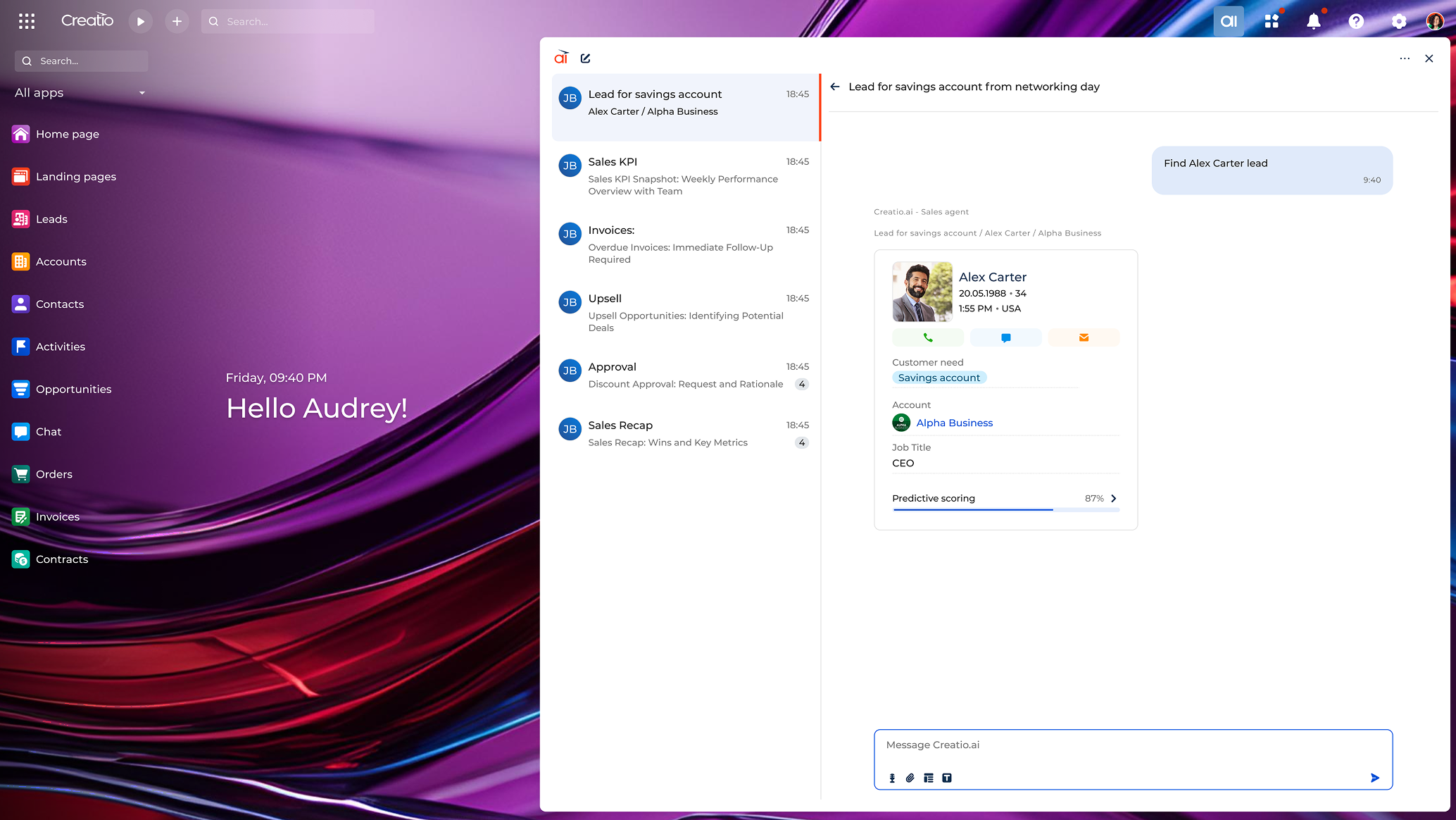
An example of a Creatio CRM zero-click experience
Over time, agents will predictively surface insights and automate actions entirely, allowing employees to work without directly navigating the CRM interface.
Agentic CRM ecosystems
CRM AI agents will expand their influence beyond the CRM itself, acting as connectors across a company’s digital ecosystem. This means they will interact seamlessly with productivity tools, ERP systems, collaboration platforms, and even industry-specific applications.
Some CRM platforms already provide this functionality, with Creatio leading the way by embedding AI agents directly into email applications, Zoom calls, and other productivity tools. As more business applications adopt similar integrations, AI agents will be able to work seamlessly across an even wider range of platforms, further reducing the need to switch between different tools.
AI Agents are Redefining Customer Relationship Management
CRM AI agents are transforming how organizations manage customer relationships by turning CRMs from static databases into intelligent, proactive business tools. These intelligent agents automate repetitive tasks, capture and update data in real time, and help users interact with the system through natural language, limiting the need for manual navigation.
The organizations that embrace AI agents early will gain more than efficiency; they will foster stronger relationships, deliver more personalized experiences, and create teams that focus on strategy and human connection instead of routine administration.
As AI agents evolve toward zero-click navigation and autonomous decision-making, businesses have an opportunity to reimagine customer engagement entirely. CRM AI agents aren’t just the future of customer management; they’re the future of how business gets done.





















































